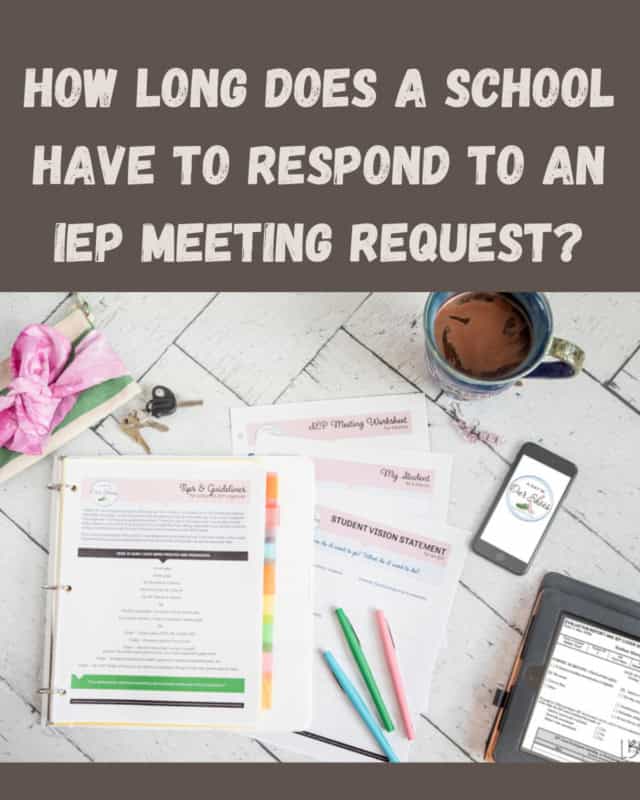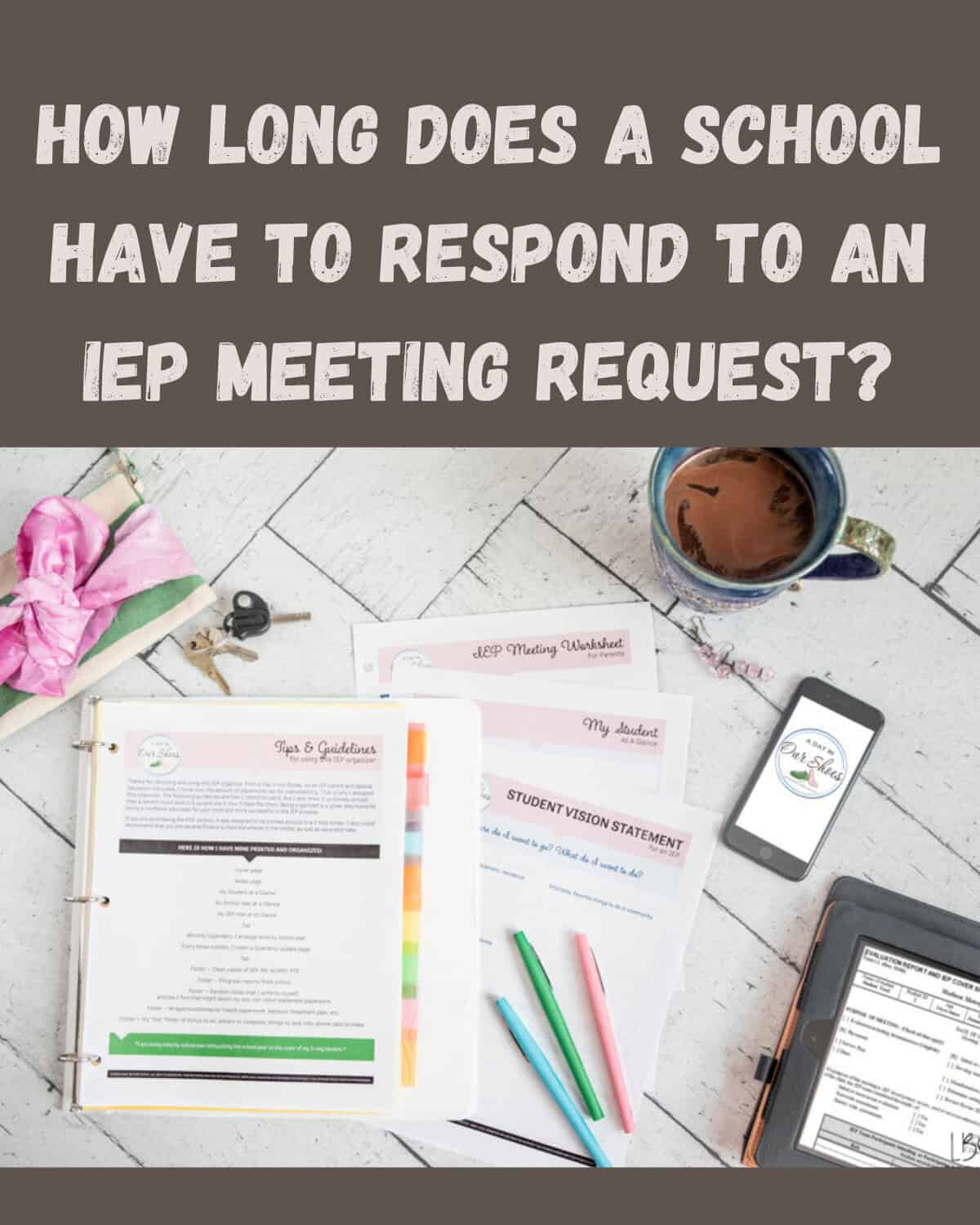How Long Does the School Have to Respond to an IEP Meeting Request? What about an Emergency?
Sometimes emergencies happen. Whether it’s bullying or autism elopement, sometimes our kids are in unfortunate and unsafe situations. And parents want an emergency IEP meeting TODAY.
So what is the parent request for an IEP meeting timeline? How long does the school have to respond to an IEP meeting request?

Unfortunately, IDEA does not define this. Some state special education regulations have set a time limit on how long the school has to respond to your request.
You can read more on how to request an IEP meeting through that link.
How often can parents call an IEP meeting?
Parents can call an IEP meeting whenever they want.
However, as I often preface thoughts and statements, “Should you find yourself in Due Process……….” you want to appear sane and reasonable.
Calling a meeting every week may not be viewed as reasonable.
I would not repeatedly request IEP meetings if the data has not changed. If your data has not changed, I would not expect the outcome of the IEP meeting to change. Get new data and make a new request, if you’re trying to get changes made to the IEP.
Emergency IEP Meeting
This comes up a lot. Call an emergency IEP meeting!
Look, I get it. A crisis of some kind has just occurred and you want action. You want this item addressed, and and you want it fixed. Yesterday.
So you try to call an emergency IEP meeting. Guess what?
No really, there isn’t. You can look in IDEA, but you won’t find it there. And while I haven’t memorized all the state regulations for all 50 states, I have yet to hear of one. I am told that some states have defined it as 5, 10 or 30 days. But even 5 days is not “Today!”
I truly understand the sense of urgency with a desired emergency IEP meeting. Several years ago, there was another student on my son’s van who was repeatedly hitting him. It took us about 5 days to get that issue resolved.
In the meantime, I drove him. Yes, I understand that this can mean a loss of income. But if you feel like your child is unsafe, do whatever it is you need to do. Call in favors from family and friends, if you need caregiving help because you want to keep the child home.
Ask the school for homebound instruction or materials until the situation is resolved. Do whatever it takes.
And, I know some families are in hostile situations with their district. I see and acknowledge you. They may delay a meeting “just because they can.” That’s really unfortunate and unfair.
At risk of sounding callous–life isn’t always fair. The IEP process is not fair. But trying to force a hurried IEP meeting which you don’t have the right to do is not an advocacy strategy I would recommend.
That can take the focus off of the real issue, as you now are arguing with your school team about the time of a meeting rather than the issue at hand. I hope that makes sense.
You should be documenting everything along the way if you are being stonewalled or your meeting requests are being ignored. You can also call your state’s hotline.
Parent Request for IEP Meeting Timeline
I have all the state special education regulations in a spreadsheet below.
IDEA does not define this. But, your state might.
If it is not defined, you have to rely on case law. While I’m not a lawyer nor do I play one on the internet–what I know is this.
A good guideline to use is “reasonable” if your state does not set a definitive timeline. I know, that’s not very concrete. What is reasonable to the school may not be reasonable to me.
However, case law has supported that a reasonable timeline to follow for an IEP meeting request is anywhere from 5-30 days.
How long does the school have to respond to an IEP meeting request?
They have as long as their state says they have.
California says 5 days, I believe.
Here are the state regulations:
Appeal to their good nature. I’m being serious. That really is all you can do. You can explain to them why this is urgent to you. I’ve been trying to instill my sense of urgency about some things to my sons and husband for years, it hasn’t worked. Still, I keep trying.
And I’m not making light of your situation. Really, I’m not. But what I find is that many parents get ‘stuck’ on the whole calling an emergency meeting thing (particularly when the school tells them they are under no obligation to do so) and then they lose sight of the core of their concerns.
The battle with the school then becomes about when/how soon the meeting is, and not about the child.
You can request an IEP meeting and ask that it be held as soon as possible. When you do that, give them all your available dates and times. Start working on ideas for solutions. Involve and engage your child in the process.
You can also check your school district website and see if they have a policy that defines this. In the end, you can hold them accountable to your state’s defined timelines, but that’s about it. And for many states, it just says that the school must respond in a “reasonable” amount of time. Fun, huh?
The IEP process is slow. So very slow.
This is why I am constantly on parents about how you need to be proactive. An IEP parent needs to be trying to predict and prevent as much as we can. You have to be an active participant, all year long. Because when there is an urgent or emergency issue, there’s no such thing as an emergency IEP meeting.
But what if my child is unsafe?
Great question. This comes up, particularly in bullying situations, or seclusion and restraint. You do not want to send your child back to school until the issue is resolved. In that case, I would call the Principal or Director of Special Ed or Pupil Services.
Explain to them, “I want to call an IEP meeting, but I understand that they can often take several days (or weeks!) to get scheduled. I do not want my child to be subject to XYZ (describe the situation) in the meantime, so what can we do?”
You should be able to get a stop-gap measure in place until the IEP team can convene and revise the IEP.
Emergency IEP Meeting Timelines
There are certain disciplinary reasons that your team will call an emergency IEP meeting.
Trust me, you don’t want one of those.
Ok, so that’s about it. Not trying to be anyone’s wet blanket, really. But it’s all about learning to use the system and what is available to you.
Asking for or demanding things that are not in IDEA is not helpful for anyone. Best to focus on what we can control.
More Parent IEP Meeting Rights Information
Here is more IEP meeting information for you.
- Can an IEP meeting be held without a parent?
- How long does the school have to respond to an IEP meeting request?
- Who is legally required to attend an IEP meeting?
- Does an IEP meeting have to be held at a time convenient for parents?
- What is an LEA representative at the IEP meeting?
- Can I exclude someone from my IEP meeting?
- Can a parent request an IEP meeting at any time?
- Can my school force a virtual IEP meeting?
- Can I record my IEP meeting?

